Tinker Tailor Soldier Spy
 for violence, some sexuality/nudity and language.
for violence, some sexuality/nudity and language.
Reviewed by: Jim O'Neill
CONTRIBUTOR
| Moral Rating: | Average |
| Moviemaking Quality: |
|
| Primary Audience: | Adults |
| Genre: | Action Thriller Drama Adaptation |
| Length: | 2 hr. 7 min. |
| Year of Release: | 2011 |
| USA Release: |
December 9, 2011 (limited—4 theaters) DVD: March 20, 2012 |
| Featuring |
|---|
|
Mark Strong … Jim Prideaux John Hurt … Control Gary Oldman … George Smiley Toby Jones … Percy Alleline David Dencik … Toby Esterhase Ciarán Hinds … Roy Bland Colin Firth … Bill Haydon Tom Hardy … Ricki Tarr Benedict Cumberbatch … Peter Guillam See all » |
| Director |
|
Tomas Alfredson |
| Producer |
|
Studio Canal Karla Films See all » |
| Distributor |
“How do you find an enemy who is hidden right before your eyes?”
In recent years we have come to see that intelligence obtained from government secret sources is never perfect. Even when verified by experts and wrapped up into a package labeled “slam dunk” doubts remain and mistakes are made. Are the occasional errors, some big and some small, worth the effort of pursuing an enemy’s operations, some harmless and most not, in order to protect ourselves from that enemy? Are some forms of subversion necessary, and moral, in the face of what could be considered a graver evil? Unfortunately, we are less aware of intelligence’s successes than we are of its failures, thanks in large part to the news and entertainment media. Weapons of mass destruction may not have been found in certain places but intelligence obtained from a presence in such places led to the crippling of a terror network in that part of the world as well as the death of that network’s supreme commander.
Intelligence can bomb the same way a movie can bomb, although a movie studio can recoup its losses far easier than a nation can. When you put together elements obtained from classified information, the same way you put together elements to make a film, you add two and two and are lucky if you get three and a half instead of a minus.
I shy away from movies about intelligence because most of them take a judgmental and conspiratorial stance. And they’re usually no fun. Another reason I don’t go to spy movies is that television now does espionage stories a whole lot better. After watching the cable production of the series, “Homeland’, which despite its many flaws, took its subject seriously and let character instead of ideology drive its story, I believed that TV had taken over where movies had long ago dropped the ball. “Homeland” was gripping and heart breaking, and it made evident the truth that none of us ever gets the whole picture. We have to do the best we can with the pieces of the puzzle we do get. In a world full of lies where only one Man could ever say “I am the Truth”, we are lucky to have even those few pieces.
I remember the British television series, “Tinker Tailor, Soldier, Spy” from the 1970s, but not that well. I do recall Alec Guinness’ contained and imperious performance. He portrayed a lot by holding back a lot, something that few actors can do well. Those enormous black glasses gave him a praying mantis look, but they were never big enough; he seemed to be saying that the more the eyes could see the less there was that was truly visible. The real world is full of handicaps and roadblocks that require something more than keen eyesight to maneuver through. It is things that are unseen that are the hardest but the most essential to detect.
I was unsure that a feature film could be as effective as the slow moving but suspenseful series was. The plot of “Tinker, Tailor…” seems too intricate, complex and chock full of twists to be compressed comprehensively and entertainingly into a two hour movie. I was satisfied; actually, I was thrilled; to see that it did fit, and did so quite well. The movie may not be the best movie of the year; I’m not a good judge of that; but I sure enjoyed it more than any other film I saw in 2011. I recommend it highly, but I advise the viewer to stay awake and play close attention. Don’t nod off and don’t sneak out for popcorn. Every scene has a telling moment, and you have to absorb each one to stay on track.
George Smiley is set to retire from the Circus, the British version of a central intelligence agency. It is the 1970s and the Cold War is at its height. Relations between East and West are bad and about to get worse. The Soviet Union is continuing to expand its empire and its philosophy. Vietnam has fallen to the Soviet bloc, and Afghanistan would soon be invaded. Smiley is convinced to put his retirement on hold and to head up a force whose task is to discover the identity of a Soviet mole who has infiltrated the upper levels of the Circus. There is a traitor in their midst, one who has access to all the nation’s secrets, and it is up to Smiley to find him. All of the top agents that he works with in the agency are guilty of something and all of them are suspects. If only one of them committed treason the rest of them are guilty of other betrayals, both big and small.
The screenplay is by the husband and wife team of Peter Straughan and Bridget O’Connor and is based on a John le Carre novel. The script is a marvel of precision and focus, but it is still a le Carre plot so things get confusing at times. Fortunately the cast fleshes out the many convoluted character traits and shady interactions well enough to make the twisted plot accessible. The actors put the story with its many layers of loyalties, ambitions, deceptions, and treacheries within reach, and make it all comprehensible. This is a case in which having not only good, but well known, actors play key rolls allows us to recognize who’s who and to follow the story much easier. The downside to that kind of casting is that it gives a big hint to who the villain is, but watching remarkable performers such as Colin Firth, John Hurt, Ciarán Hinds, Benedict Cumberbatch, Kathy Burke, and even the diminutive but always dependable Toby Jones gives us the clarity to perceive what would otherwise be a twisted jumble of characters who'd be impossible to follow.
At the helm of the remarkable ensemble is Gary Oldman who plays British master spy, George Smiley. Where Alec Guinness favored eloquent speech and commanding presence Oldman goes for silence and a kind of wallflower existence. He hardly seems to be part of the spy network, or of the movie, in the early scenes. He has nothing to say and his face is impossible to read. Only later is it evident that he takes in everything and misses nothing. He has no illusions about working for the greater good; he understands that bad things are often done to keep evil, real evil, at bay. Oldman wears the glasses too, but they’re not as big and not as dark as the ones Guinness wore. Oldman’s are the eyes of a battered and wounded world, and his resigned but knowing Smiley takes those wounds upon himself. Every scar from every battle shows in the lines of his face. Oldman has done something great with his low key but gripping performance. He recreates a character that many of us thought we knew and has revealed someone new, a man of not just his own Cold War time, but of our own time as well. The setting may be dated, but he is not. There may be no place for a movie style hero in Smiley’s world, but he is a man who gets a job done, a job that does honor to his office and to his country, although he would be the first to say that what he does is rarely honorable. Oldman obviously has great respect for George Smiley. Compare his approach to his character to the contempt that Leonardo DiCaprio oozed in his depiction of J. Edgar Hoover in the recent “J. Edgar”. DiCaprio let an unconcealed hostility for Hoover take down his performance. There are defiled things all around us; and there are lots of rumors too; individuals, including filmmakers, can choose to rise above those things or to wallow in them. Gary Oldman’s George Smiley is no wallower.
The film was directed by the Swedish director, Tomas Alfredson who made an excellent vampire movie called “Let the Right One In in 2008 (it was remade in 2010, but not as well, as “Let Me In” by British director, Matt Reeves). In that film Alfredson showed a knack for revealing unseen things that prey on and torment a person’s soul. He seems to have as keen an eye as George Smiley. His focus on detail and his unusual staging of scenery and dialogue is unsettling but it works perfectly for a spy thriller that is so often surprising and disturbing. He hits all the right nerve endings and keeps the plot clear and cohesive, even when he is shooting a scene from a disarming distance or from behind a character’s back, something of a comment about how a lot of human communication actually takes place.
The film is set in Britain (with a few excursions to Budapest, Istanbul and Paris) in the 1970s, and it captures the period in all its economic and cultural gloom, a veritable wasteland that was ripe for sedition, the same way the 1930s created an environment for a group of well to do Cambridge students to find an excuse to turn on their country. “Tinker, Tailor…” hints at some of the same sins that led to that earlier dark period in British history, and makes evident that small sins are not so small when they condition us to commit bigger ones, and prime us to rationalize our defects, whether small or grave.
Violence: Moderate / Profanity: Moderate / Sex/Nudity: Mild
See list of Relevant Issues—questions-and-answers.


Moral rating: Average / Moviemaking quality: 5
Moral rating: Average / Moviemaking quality: 4½
A fairly full theater of mostly middle aged and older people sat patiently through two plus hours watching very nicely designed scenes and good cinematography. There was truly only one comprehensible character in this movie, and that was the mood—the mood of the cold war, with its gloom and doom and suspicion.
Very bizarre movie experience, for me. However, if I had a chance to see it again, I might try, just to see if I can find some thread of a plot and clues. I had no idea what I was watching.
Moral rating: Very Offensive / Moviemaking quality: 4
There was a moderate amount of blood and gore that is shown. There is a way-too-long sex scene in which you see nudity, there is also a club/bar scene in which a woman is topless and frontal nudity is shown. Not to mention all the other club/bar sexual activities and scantily clad dressed women. From a Christian point of view, I would not recommend this movie at all.
Moral rating: Very Offensive / Moviemaking quality: 3
Moral rating: Offensive / Moviemaking quality: 3
Moral rating: Offensive / Moviemaking quality: 4½
PLEASE share your observations and insights to be posted here.
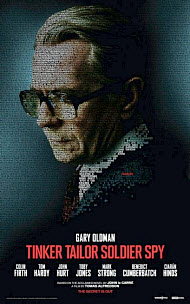

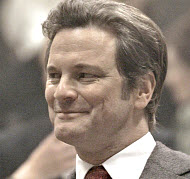


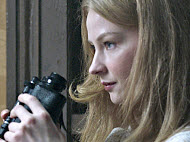
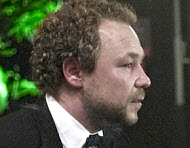
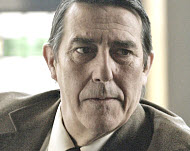
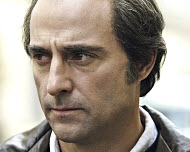
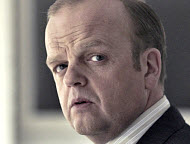
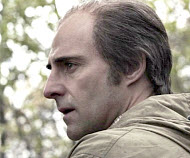


My Ratings: Moral rating: Offensive / Moviemaking quality: 4